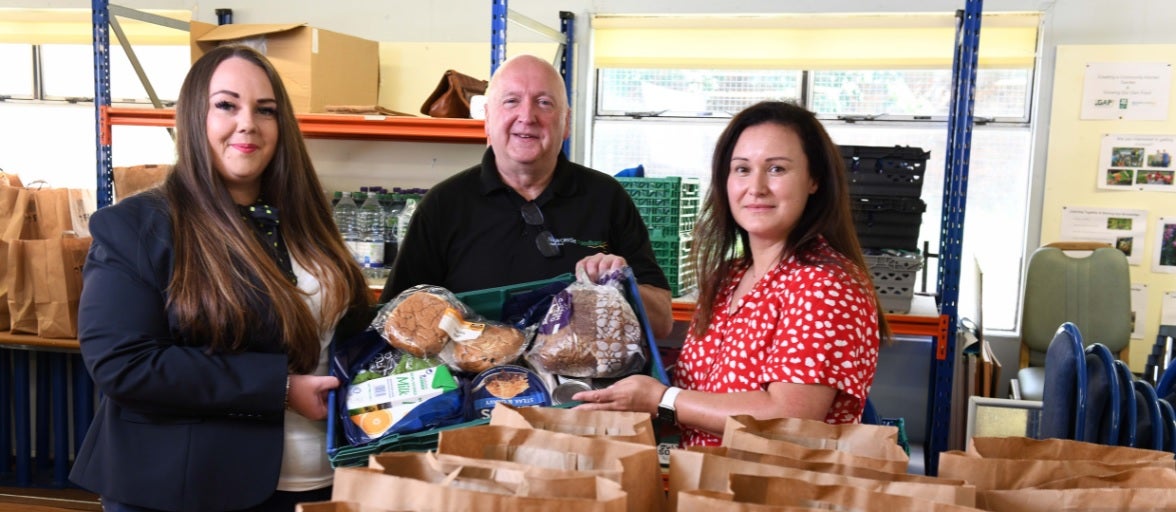
Download the press release here.
The North East’s busiest foodbank is tackling a significant spike in demand for its support with the help of a four-figure grant from the Newcastle Building Society Community Fund at the Community Foundation.
Newcastle West End Foodbank operates from seven centres across the city region and provided emergency food aid to over 43,000 people during the 12 months to the end of March this year, 30 per cent of whom were children.
It distributed an average of 1,400 three-day food parcels every month over the same period, with around 260 tonnes of food being given out in total, but it has seen demand increasing quickly this year and recently dispensed more than 2,000 food parcels in a single month for the first ever time.
The charity is also having to spend significant amounts of its own resources on buying food to meet this rising demand as a result of a fall in donations at its supermarket collection points due to the impacts of the pandemic and the current cost of living crisis.
To help meet its rising monthly running costs, the Foodbank has received a £3,000 grant from The Newcastle Building Society Community Fund at the Community Foundation Tyne & Wear and Northumberland, which offers grants to charities and community groups located in or around the communities served by the Society's branch network.
Founded in 2013, Newcastle West End Foodbank is one of the UK’s biggest and busiest foodbanks and is part of The Trussell Trust network.
Service users are referred to it from a number of sources, including GPs, social services, health workers, the police and Newcastle City Council.
It also works in partnership with specialist agencies to help people overcome the often-complex underlying problems that have led to them needing the foodbank’s help, such as financial issues, worklessness, risk of homelessness or addictions.
For the last five years, it has held collections outside St James’ Park at all Newcastle United’s home games with the help of the club and the NUFC Fans Food Bank group.
John McCorry, CEO at the Newcastle West End Foodbank, says: “The Newcastle public are incredibly generous and caring, and always give us what they can, while the support we get from corporate backers like Newcastle Building Society makes a massive difference to the work we can do.
“We work across one of the region’s most economically and socially deprived areas, and in the current situation, every donation that we get, however big or small, is absolutely invaluable.
“We’ve found lots of people coming to us for help for the first time this year, including many people who are working, and to be distributing more than 2,000 food parcels in a single month at a time of year when demand is usually below average is a very sobering position to be in.
“With the winter months around the corner, we know that the need for our help is going to increase still further, so having Newcastle Building Society’s continuing support will help us do as much as we can
Newcastle Building Society is a long-term supporter of the Newcastle West End Foodbank, with a £3,000 grant in 2020 enabling the charity to install a large, well-equipped greenhouse at its kitchen garden at the Lillia Centre on Benwell Road to extend the garden’s growing season and provide an even wider range of fresh produce for its service users.
Kelly Johnson, manager at Newcastle Building Society’s West Denton branch, adds: “Newcastle West End Foodbank makes an immeasurable contribution to the well-being of tens of thousands of people across our home city.
“It has continued to step up at times of the greatest need to provide the help that our local communities need and we’re proud to be continuing to contribute to its essential work.”
Since its launch in 2016, Newcastle Building Society’s Community Fund at the Community Foundation has also contributed over £2.1m in grants and partnerships to a wide variety of charities and projects across the region, including the Sir Bobby Robson Foundation and the Prince’s Trust.
The grants are so far estimated to have had a positive impact on more than 151,000 people.



